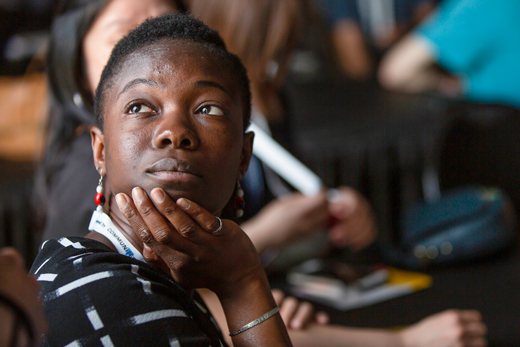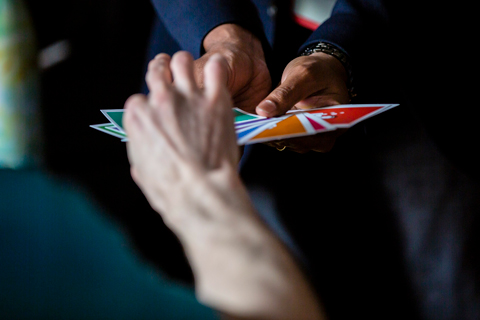"When should business be talking about the ethics of technological advances?
Now. Now is the time, says Marcel O’Gorman, professor, author and analyst of society’s uncritical acceptance of the pace of our technological present.
“How do we integrate values into our companies, organizations and personal lives? There’s a moment happening now with values in the tech community,” O’Gorman said.
Society’s trust, or distrust, of the tech community is a conversation that wasn’t happening a few years ago, “but it is happening now,” he added.
On the first day of True North 2019, O’Gorman, a University of Waterloo English professor and Director of UW’s Kitchener-based Critical Media Lab, led the conference’s first workshop, titled the Tech for Good Ethos Studio, to help some 100 attendees, partners and conference presenters stretch their thinking about ethics and technology.

About 100 attendees took part in the University of Waterloo’s Tech for Good
Ethos Studioat True North 2019. (Communitech photo: Sara Jalali)
Key to the workshop were the tenets of the Tech for Good Declaration, created last year at the inaugural True North conference.
Those precepts are:
- Build Trust and Respect Your Data
- Be Transparent and Give Choice
- Reskill the Future of Work
- Leave No One Behind
- Think Inclusively at Every Stage
- Actively Participate in Collaborative Governance
O’Gorman led an audience that included academics, industry associations, and small and large organizations, through a “speculative design exercise” — actually several exercises — that had the Tech for Good precepts top of mind.
The workshop icebreaker was a deck of Tarot Cards of Tech placed at each table, created by the Seattle-based Artefact Group. Each card, with names such as The Radio Star or The Forgotten, posed such questions as: “What could cause people to lose trust in your product?” or “How would a community of your most passionate users behave?” or “What would using your product too much look like?”
The first exercise used the fictional case study of Facebook (“This is like shooting fish in a barrel,” said O’Gorman), with participants choosing different cards at their tables, and considering how they applied to Facebook’s products.
The exercise became more personal when O’Gorman asked attendees to discuss how their own companies or organizations would respond to the questions on the cards. (The Tarot Cards of Tech are open source and available here.)

Attendees of the Tech for Good Ethos Studio used the Tarot Cards of Tech to
ponder ethical questions their companies might face.
(Communitech photo: Sara Jalali)
After that, participants were asked to take one of the six precepts of the Tech for Good declaration and explain how it could be implemented in their workplaces.
The conversations buzzed with enthusiasm, passion and challenges.
“How can we find solutions for the smaller companies?” “We need to involve seniors, new Canadians and people in remote areas.” “Tech for Good could change the relationship between clinicians and their patients, with health groups seeing themselves as organizations, rather than a collection of individuals with individual clients.” “How do you pitch Tech for Good to a VC? If he subscribes to those values, you pitch it. But if he doesn’t maybe you leave it.” “The spirit of trying (to implement collaborative governance) is there at many levels, but the time involved is the pain point.” “Ultimately, a decision has to be made.”
New ideas emerged as table representatives summarized their discussions for the room: One attendee wondered, after filling out several forms that had only two options for gender (M or F), whether inclusion would mean offering an M/F/Other option. Another suggested that the WHMIS (Workplace Hazardous Materials Information System) of hazardous product labelling could be applied to tech, so that users could more easily understand the consequences of its use.
O’Gorman told the crowd that not all organizations have a platform for the kinds of discussions the room was having. But he hoped the participants would use their experience to start those conversations.
“The Tech for Good Declaration is a living document that you can take back to your organizations,” he said."

